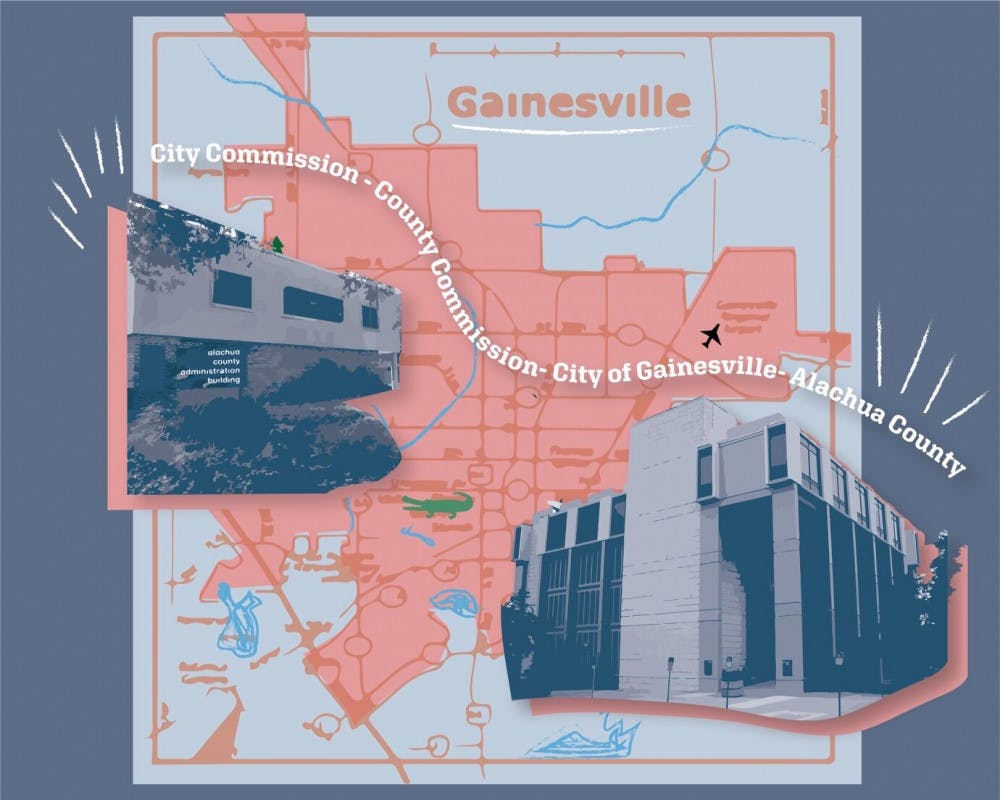A resident crumpled up the Gainesville Guardian newspaper with headlines about East Gainesville and then unfolded it to reveal the words “Don’t Be Bullied.” His actions were met with applause from the audience at Tuesday’s Alachua County Commission meeting.
The commission voted 3-2 Tuesday night to purchase land originally meant for affordable housing, officially stopping construction of the proposed Dogwood Village.
The original item on the meeting agenda was to continue the county’s agreement with the Florida Housing Finance Corporation through nonprofit Ability Housing to develop 96 units of affordable apartments for mixed income people. Dogwood Village would be located in East Gainesville on SE 15th St.
When the commissioners voted 3-2 on Dec. 13 to pull out of the agreement, the company threatened a lawsuit amounting to $15 million in a letter to the commission. The vote Tuesday warrants the same response.
After 42 public commenters, the vote came down to Commissioner Marihelen Wheeler, who voted in favor of Commissioner Ken Cornell’s substitute motion to purchase the land and have the commission do its own work on selling it to other developers.
“Don’t applaud,” she said, as the meeting was adjourned. “This is really hard. This is not a cause for celebration.”
Despite threats of a lawsuit — and the fact that Alachua County will now be low on the corporation’s list for any more funding for affordable housing for two years .
Deliberation on the item lasted over four hours with an audience of around 60. The meeting ended close to 10 p.m.
The majority of commenters were Black and against the Dogwood’s construction. Many pointed to persistent issues of food deserts, transportation disparities and lack of jobs in East Gainesville.
Those who didn’t want Dogwood also brought up how the majority of affordable housing projects are built in East Gainesville. Many suggested considering options in West Gainesville, which is predominantly white, in places with greater access to resources for the working class who would live in the housing.
The way most people in the audience grew up was different from how commissioners like Alford and Anna Prizzia grew up, said Eric Lopez, commenting at a public meeting for the first time.
He didn’t support the project. But he wasn’t surprised by Alford and Prizzia’s support of Dogwood Villages, he said.
“You are a product of your environment,” he said. “It’s hard for me to look at you and be mad at you because of how you were brought up.”
Resident Sherry Roberts described her experience at affordable housing complex Eden Park, meant for a similar income level as Dogwood Village.
Many residents were doing drugs, she said, and neglecting their children. She also spoke on her experiences growing up in Kennedy Homes, an affordable housing complex now replaced by Heartwood Homes, a public housing neighborhood. She was raped and offered drugs a child, she said, and witnessed a man’s murder when she was 9.
Roberts is concerned affordable housing projects are not viable in East Gainesville because the circumstances create a cycle of poverty for people without access to jobs and transportation. She could see Dogwood Village becoming like Eden Village and Kennedy Homes, she said.
“We’re not against affordable apartments,” Roberts said. “We’re fighting for the children that are going to end up being traumatized.”
Kennedy Homes was approved by the county in the 1960s. But after a couple decades, it had declined enough to warrant demolition. The descent of Kennedy Homes came after ownership of the land exchanged owners from Volunteers of America, a nonprofit group similar to Ability Housing, to the company Aimco, which didn’t keep the same living standards as the previous owners. A federal inspector described them as “uninhabitable.”
Commissioner Charles Chestnut mentioned Kennedy Homes in his closing comments on the issue. The problem isn’t building more affordable housing but maintaining it in places that can sustain it, he said. The longevity of the problem shows that the methods the county has been using for decades need to change.
“I think I heard earlier tonight that a citizen said we never listen,” he said. “And I think that is true. We don’t listen.”
Commissioners Chestnut and Cornell were vocal about their opposition to Dogwood Village, while Commissioners Prizzia and Alford were in support. Wheeler began the meeting by supporting Alford’s motion, but she eventually turned to the audience by the meeting’s end and asked them direct questions, stepping outside of protocol.
“You guys have got to be sure that you have a plan and that you have people willing to follow that plan,” she said, addressing the audience after their unofficial comments.
Wheeler had originally voted against Dogwood Village in December. She planned to bring the motion to restore the project herself, she said, but her vote changed, and she decided to stick to her December vote.
The county doesn’t have the jurisdiction to develop the land it has now committed to purchase, but it can sell it to companies. Wheeler wants to see alternatives from the community for what can be built on the land, she said. Her own suggested plan includes storefronts to combat food deserts and affordable houses, not apartments.
“I will vote tonight with my head and not my heart,” she said. “My heart is with the people out there in the street who need houses. But my head tells me also that we’re going to have to listen to these people.”
However, Prizzia objected to public commenters’ characterization of people who live in affordable housing. Drug dealers, criminals and homeless people were not the target renters for Dogwood Village, she said.
“That, to me, is just such a negative and backwards impression of what affordable housing is and what we need,” she said.
There were also several public commenters from labor unions: the Alachua County Labor Coalition, the North Central Florida Labor Coalition and Graduate Assistants United. All were in favor of building Dogwood Village, and most were white. GAU Co-President Bryn Taylor specifically spoke about UF graduate assistants needing affordable housing due to their low yearly stipend.
“I’d like to expand your ideas of what an impoverished person looks like,” she said.
Eventually, though, the commission voted against building Dogwood Village.
Ability Housing spokesperson Natalie DeYoung wrote in an email that the organization could now face significant financial losses due to the county’s decision. Its leadership is currently awaiting clarification from commissioners regarding plans to ensure Ability Housing is not permanently harmed. The organization is also currently “assessing its options,” according to the email. It is unclear whether it still plans to sue.
Contact Siena at sduncan@alligator.org. Follow Siena on Twitter @SienaDuncan.

Siena Duncan is the Fall 2024 Editor-in-Chief of the Alligator. She's interned for the Salt Lake Tribune, the Tampa Bay Times and POLITICO. In her spare time, she loves to take walks to see the cows by her apartment and add more to her sketchbook.






